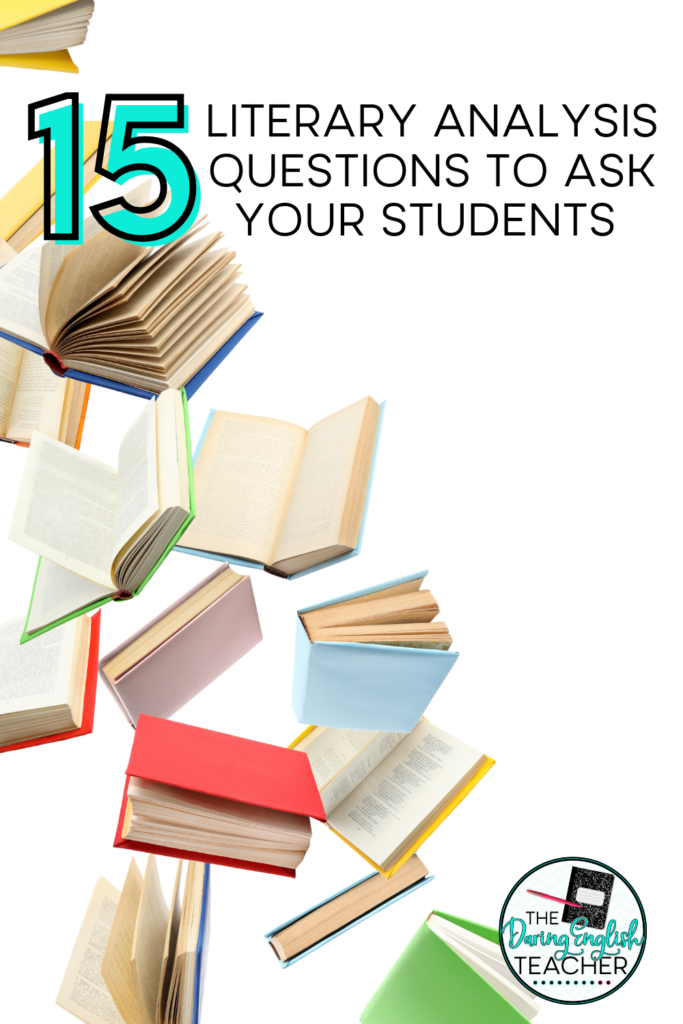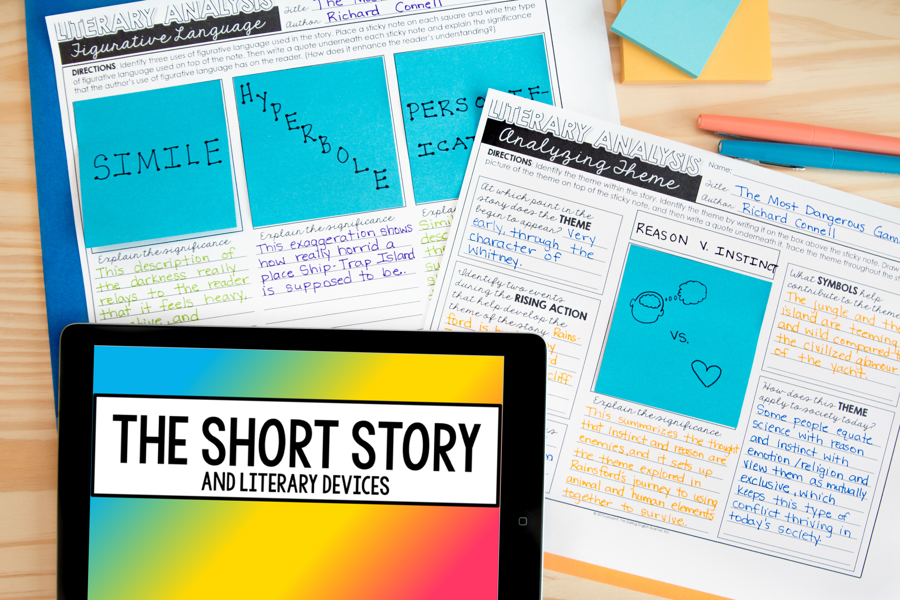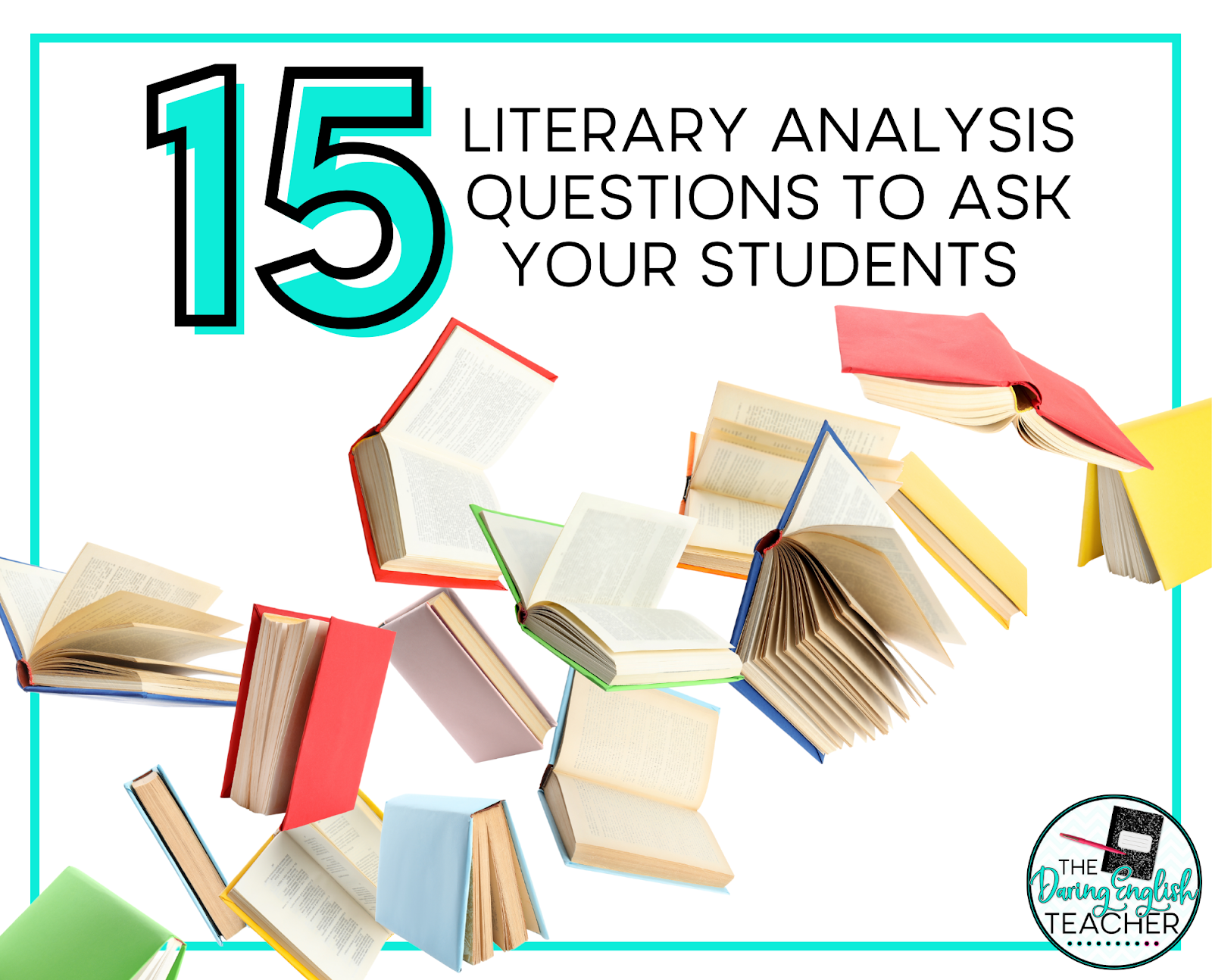Teaching literary analysis in the secondary English classroom is an essential cornerstone of high school English and middle school English curriculum. When students learn the process of literary analysis, they will embrace the new challenge each literary text brings. How do you teach literary analysis essay?
 When teaching fiction in the middle school ELA or high school English classroom, whether it be a short story or a novel, it is important to focus on more than just comprehension. While it is important to ask students about what they read, we must also ask them to analyze what they read.
When teaching fiction in the middle school ELA or high school English classroom, whether it be a short story or a novel, it is important to focus on more than just comprehension. While it is important to ask students about what they read, we must also ask them to analyze what they read.
When I first teach literature to my students, I use direct instruction strategies. I provide my students with literary analysis terms and examples. Then we begin short stories and excerpts together. Usually, we will analyze a couple of short stories together as a class before moving on to more substantial pieces, like novels. One blog post that might be helpful is this one about how to write a literary analysis response.
When I’m teaching a piece of fiction, I like to have set questions I can use throughout the year to ask my students. As students answer the same question about various texts throughout the year, they improve their analytical skills and begin to form a better understanding of how literature analysis works.
If you are teaching response to analysis and literary analysis, here are ten questions you should ask your students about the piece they are reading. These questions are some of the questions included in my Response to Literature Task Cards that work with any piece of fiction. Here are several questions to guide your students as they analyze literature.
Here are 15 questions you can use when teaching literary analysis to your students.
Literary Analysis Questions About Theme
- How do the characters in the story develop or enhance the theme?
- How does the conflict of the story develop or enhance the theme?
- How do the symbols within the story develop or enhance the theme?
- How does the author’s tone of the story develop or enhance the theme?
- How is the story’s theme reflect the context in which it was written?
Literary Analysis Questions About Setting
- How does the setting affect the plot?
- How does the setting affect the conflict?
- How does the setting affect the tone of the story?
Literary Analysis Questions About Characters
- What is one of the protagonist’s flaws or weaknesses?
- What is one of the antagonist’s flaws or weaknesses?
- What motivates the protagonist to act?
- What motivates the antagonist to act?
- What character is most believable and why?
Literary Analysis Questions About Conflict
- How does the conflict reflect the context of the time in which the story was written?
- How does the author create a believable conflict?
Here are some literary analysis teaching resources you may like:
Literary Analysis with Sticky Notes
Teaching literary analysis can be fun, engaging, and accessible for all students! Increase student engagement and understanding in your next literary analysis unit (whether it be short stories or novels) with interactive and hands-on close reading organizers and scaffolded writing responses. Students will enjoy using sticky notes in class as they analyze the author’s use of various literary devices in complex short stories and novels.

What fellow teachers say about this resource:
⭐️⭐️⭐️⭐️⭐️ Extremely satisfied
“My students found this very helpful to organize their writing and the movement involved with using sticky notes was a hit. The kids loved getting to use sticky notes and to flip them up and down. It made the planning for their writing so much faster. Would highly recommend for all students but especially for any kids who have a hard time focusing.”
⭐️⭐️⭐️⭐️⭐️ Extremely satisfied
“This is a great way to have kids write literary analysis in a different way instead of just asking for essays. It’s like a little trick to get them to do academic work while thinking they are just doodling on sticky notes. I even use this with AP Lit and just modify my expectations somewhat. I appreciate all the different handouts/options.”
More resources:
My Literary Analysis Mini Flip Book combines the fun and excitement of sticky notes with the format of a mini flipbook. It is the perfect culminating activity for students to analyze a final short story in your short story teaching unit.
These Response to Literature Task Cards are an ideal way to get students talking about complex literary themes and ideas within any piece of fiction. There are two sets of tasks cards in this set, and you can use them again and again with any short story or novel.


